Rings of Power may possibly have the most burdensome weight of legacy and expectation in recent media releases. A “prestige” television series in the tumultuous world of streaming following in the footsteps of the beloved Lord of the Rings trilogy and (less beloved) Hobbit trilogy, building upon a limited selection of texts due to the bizarre deal struck between Amazon and the Tolkien estate to tell a story about the Second Age but not allow any use of Silmarillion, Unfinished Tales or History of Middle-earth, by most accounts the series should be an abject failure, buckling under the weight of a house of cards supporting truckloads of money. By most accounts of the world of streaming video in the wake of HBO/Discovery/WB’s idiocy and constant cancellations of promising shows by the likes of Amazon, Netflix, Hulu and such, it certainly seems like the promises of what streaming media could produce have all been shattered upon the anvil of quick money and “creative” accounting.
And yet, with the shadows of all possible bad outcomes looming over it, the first two episodes of Rings of Power, for the most part, present Tolkien’s most consistent narrative theme: hope. The show isn’t perfect, and whether it will stick the landing of telling a compelling story across its hour-long episodes for this first season remains to be seen, but what is here contains some intriguing and entertaining returns to a Tolkien-esque world.
Please note that this review contains slight spoilers.
In The Shadow of Giants, A Tree Still Grows
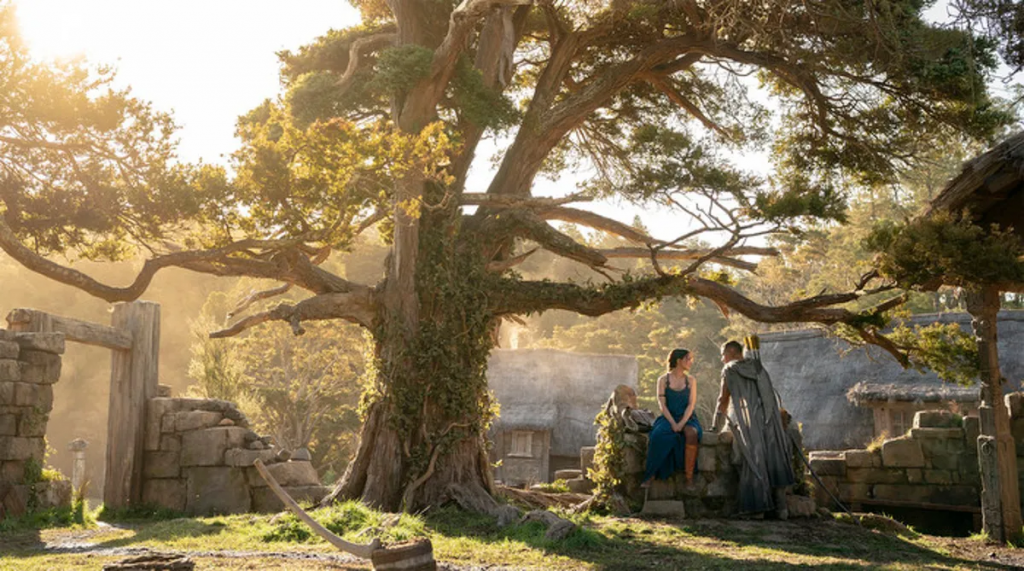
Rings of Power starts with a scene of young Galadriel nearly killing another elf child. Really, this is all you need to start things off well if you’re trying to build your story to be about Girl Power. In reality, Galadriel’s story is probably the most interesting of the interwoven stories in the show so far, so this is half tongue-in-cheek; considering she’s the only other ‘known’ named character in the show to casual viewers (the other being Elrond), this is great, because if her storyline sucked, I think I would have shut the show off thirty minutes in. Instead, we are treated to a character with a shocking amount of depth for a Tolkensien Elf: Galadriel is smoldering anger and rage, guilt and pride, selfishness and skill. She makes for a compelling heroine and her singular desire to hunt down Sauron and avenge her brother’s death is all we really need to follow along with her and get on board: this is a woman who wants to get stuff done and literally turns away from entering paradise to do so.
Look, Tolkien wasn’t very good at vague allegory, so let’s be honest: nothing in this show is vague about its subtext, and that’s fine. Honestly, you could probably argue it’s sort of refreshing in an age of media up their own asses about supposed cultural commentary and moralizing.
Galadriel also benefits from having literal plot armor: if the audience only knows her from the films, they still know that she’s going to make it to the end of the story, so her portrayal in Rings of Power is “safe” but also vastly interesting. The Galadriel of the War of the Ring is a recluse, one who seems wise but unable to have done anything to prevent the current situation. Rings of Power’s Galadriel, though, is a fiery rebel, and the maturation of her character over the thousands of years between this story and the Third Age is, hopefully, going to make for great television. Some of that spark–the threatening aura of Galadriel and her immense potential power–come through in small scenes here, particularly her discourse with Elrond.
She’s also kind of a badass, and gets all the Cool Action Sequences in the show so far, which is a nice bonus. Perhaps the most gratifying part of Galadriel’s run at protagonist is that the show also presents her as beautiful without objectifying her, despite numerous options to do so in the second episode. In fact, Rings of Power manages to center women in the majority of the interwoven plots, and is a better show for it: the Harfoot’s Nori, the Dwarven Disa, and human Bronywn all help create a far more realized and, frankly, interesting Tolkien-esque world than the previous films have. How long that continues, and to what extent, remains to be seen, but there’s a hint that the Numenorians will have a similar Gaslight, Gatekeep, Girlboss character, and I’m honestly here for it.
Pointy-eared Problems
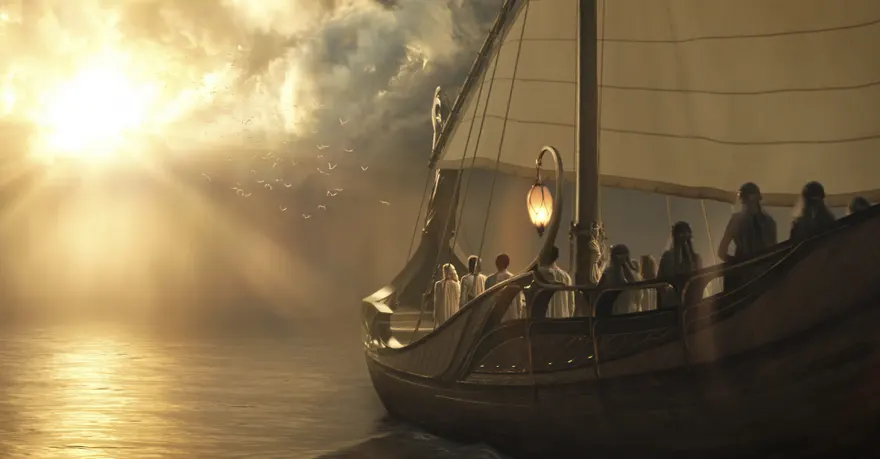
There are a few issues with Rings of Power, though, and Elves make up 90% of those problems. For the most part, it boils down to the fact that the Elves in the show are basically just Humans With Extra Steps, with the actual humans of the show being caricatures of human nature. This is most present in the narrative branch that involves Arondir, a Silvan Elf who has the hots for Bronwyn and so far possesses the emotional coldness of a JJ Abrams Vulcan. This would be fine if the rest of the Elves were similarly aloof and cold, but they aren’t: Arondir’s patrol partner is a loud-mouth boor, their boss is a racist (against humans), and the rest of the elves in the show are a varied mix of emotional states. Arondir’s coldness and emotional constipation towards his forbidden love makes his scenes feel all the more awkward for it. Similarly, Theo, Bronwyn’s son, has a subplot that feels like it should be more important than it is given time for, but his intertwining with Arondir and Bronwyn’s romance feels awkwardly paced, at least for right now. How this plotline develops remains to be seen, but it is perhaps the weakest subplot so far.
The parts in which Rings of Power falters are the parts in which the characters aren’t really allowed to act like ‘people’, but instead act like caricatures of ‘people’. Arondir so far struggles to be compelling, and so far humans are the least, well, “human” characters in the show. The Second Age lore in the show implies that humans at some point aligned with Morgoth, and that the Elves rule over them in an unhappy arrangement for both races. This manifests in Arondir’s introductory sequence, featuring some of the most stilted acting in the entire show so far, complete with faux-racism, “you people” style talk, a bar-stand off with a Malcontent Youth that is so comically over the top that it feels out of place, and then just peters out. Perhaps the biggest issue for the humans in Rings of Power so far is that the show is not making a compelling argument to disagree with the way the Elves view them: as a ticking time-bomb, likely to commit to evil eventually, rather than showing humans as the mixed-bag race that Tolkien wants them to be: a race with unlimited potential that is also self-destructive.
Of all the Tolkien races in the show, the Dwarves are the ones that are nailed perfectly, for better or worse. Tolkien dwarves are brusque, selfish, and paranoid, and the brief interactions we get with them in episode two live up to that stereotype quite well. Unfortunately, this also doesn’t bode well for any particularly interesting narrative deviations from Tolkien’s lore in this regard–and, if you are at all aware of what happens to Dwarves by the time of the Hobbit and especially by Lord of the Rings, that’s not great–with almost all of that weight for a new take being placed entirely on Disa’s shoulders (and, well, one of her first lines of dialogue in the show, coupled with the series trailer, seems to imply that the writing is already on the wall for that not happening), but at least the show gives us some impression of Dwarvish culture before everything goes to a Balrog in a handbasket.
Which leaves us with the Harfoots.
They’re Taking the Harfoots to Parallelism-gard
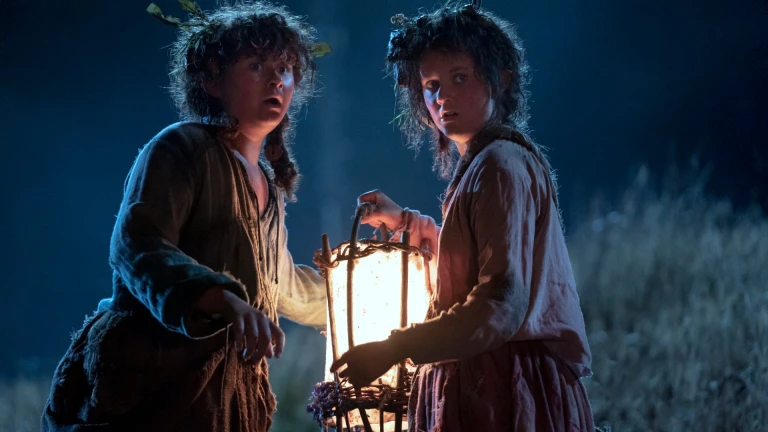
There are no ”Hobbits” in Rings of Power. There are, however, Harfoots, which are one of three types of Hobbits in Tolkien’s mythology (For the record, the other two are Stoors, which is where Smeagol comes from, and Fallohides, which is where Bilbo, Frodo, etc. all come from). Supposedly the smallest of the three Hobbit races, the Harfoots in the show feel just as ‘big’ as their eventual main character cousins, much of which boils down to the charming Nori and her sister. The Hobbits–sorry, Harfoots–of Rings of Power are nomadic, wandering and staying out of sight of others through cunning, nervous energy. There’s a lot of the ‘charm’ to Hobbit life in these past, ancient versions of the archetype Lord of the Rings fans know, and that includes the curious, risk taking rogue agent in the bunch. While at first their link to the main plot seems extremely tenuous, the arrival of “The Stranger” (A character who is very likely a Maiar of some sort, which is the race that Gandalf is a part of) via meteorite changes that, as it becomes obvious that the mystery of who he is, and what he wants, is going to drag Nori into the main plot of the show, for better or worse.
For me, this was one of the most interesting parts of the set of episodes, because it so clearly wants the audience to draw a comparison between Nori and the Stranger and Bilbo/Frodo and Gandalf. The show clads the tall, gaunt man in shabby grey netting, and he seems able to use magical powers of some sort, much like Gandalf’s small tricks. The most obvious link, his ability to commune with fireflies (much like Gandalf does to the moth) is also where things start to go sideways, as the Stranger’s power is either not fully in his control, or simply uses up the lifeforce of other things around him to get what he wants. The fireflies forced into communicating his desire to find a constellation becomes less a moment of triumph as Nori struggles to talk to the mystery man, and more a foreboding omen that there’s likely a lot more hardship to come. Probably the biggest unclear part of the Stranger so far is if the show wants to imply that his out of control ‘magic’ is what breaks Nori’s father’s foot, or if that’s just an awkward jumpcut between the two scenes. Time will probably tell, but for now, Rings of Power’s version of Hobbit and Wizard has a lot less comforting outlook and a lot more foreboding drama.
In a lot of cases, this parallelism is what makes Rings of Power interesting in the space that it exists in. It isn’t allowed to be the ‘true’ Second Age story because of rights limitations, and it also can’t do anything ‘new’, so there come obvious links between the 6 films (specifically Lord of the Rings more than Hobbit, though) that even in the first two episodes start to pop up. These aren’t as obnoxious as “Well THAT just happened!” style 4th wall breaking in most Star Wars and Marvel fare, and in fact they kind of reward familiarity with the stories in the way media is usually supposed to do so, setting up expectations and then gently (or not) playing with them. Nori and the Stranger for Bilbo and Gandalf, Elrond and Durin for Legolas and Gimli, Arondir and Bronwyn for Aragon and Arwen, these all bring some of the familiar Tolkien story beats and character types, and so far seem intent not on twisting them to subvert those expectations, but instead seeing where they can go with those storylines that the original film/novels didn’t.
Corruption, But as a Treat
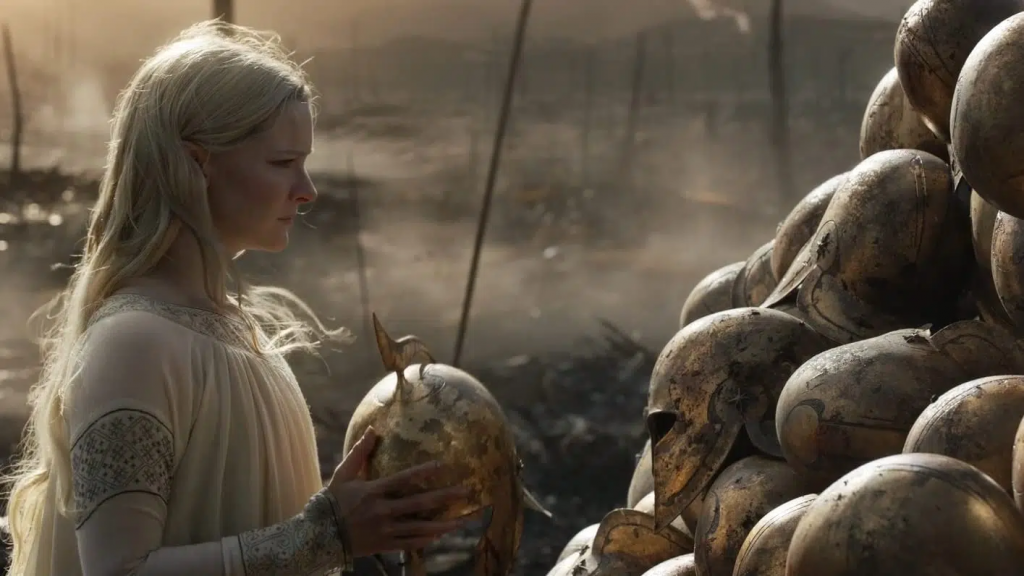
This theme of revisiting common storylines seems most obvious when the show touches on one of Tolkien’s favorite storybeats: corruption. Since the story takes place before the forging of the Rings themselves, there’s quite a lot of corruption yet to come down the line, but the show doesn’t seem like it wants to sit idle on that theme in any way, shape, or form. The first episode features a few variations of that theme, from cowardice and greed, to poisoning and rotting, to the literal corruption of a character’s mind through Black Speech. The show isn’t really beating you over the head with the theme that “people can be seduced to corruption even with the best of intentions,” but it certainly feels very Tolkien to have a character secreting away a hidden object that they become obsessed with, while other characters make selfish choices that put themselves, and others, in danger by doing so.
This maybe is where the fact that the show makes Humans so “weak” becomes a bit of a problem. That character that becomes obsessed doesn’t feel that shocking, and it doesn’t quite feel like a tragic corruption of innocence. Instead, the show sort of does a bad job of making humans except for like two people NOT be weak, conniving, nearly animalistic savages (the scene on the raft is really quite bad). The Dwarves, too, are already well on their way to being corrupted by their greed–it is Tolkien, I suppose–with the obvious discovery of Mythril that many Lord of the Rings fans may realize is the main reason Khazad-dum is a mausoleum of horrors and not a majestic city in the main series.
The Elven corruption, though, is perhaps the most interesting. When readers/viewers encounter Elves in the “future”, they’re few and far between, a race that is far past their prime and knows it. Here, however, the Elves are much more haughty and powerful, but open to the same types of downfalls as everyone else. If anything, Rings of Power is a story about corrupting influences (literal and figurative), which is not exactly an inspiring or happy story, but is indeed one that opens up for lots of triumphs and overcoming in the future.
But should you stick around to find out? Well…
And in 60 Minutes, Bind Them
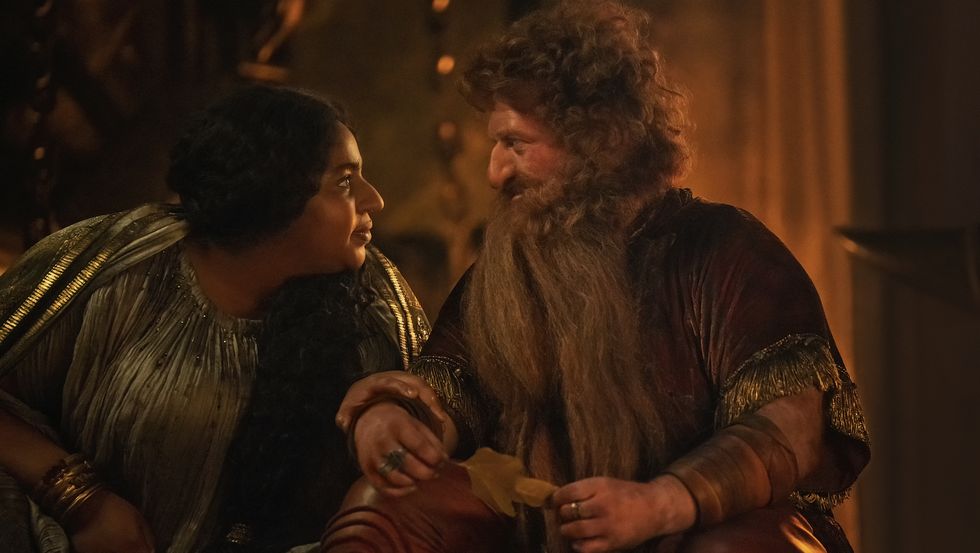
Rings of Power feels like what people want from a lot of flopped media dynasty attempts. It isn’t needlessly violent or cruel, it doesn’t play into the worst common denominator of its fanbase, and it doesn’t rely on you knowing every single minutiae of the Tolkien world. It simply operates on the level of telling a story in a familiar universe but far, far in the past from what you “know”, and in that sense, the story so far succeeds. I absolutely think the show is worth watching, but the biggest hurdle for Rings of Power is going to be the weekly release.
I’m not going to review every episode–in fact, we’ll return when the season is over and review it as a whole–but I can already tell that pacing is going to be the make or break part of this show. The 2 hours I spent watching episodes 1 and 2 were great, but next week I’m not sure enough is going to ‘happen’ in the single hour I’m given to make it worth sitting down and watching it. That’s likely my biggest fear for the show, is that it will simply just have too little happening every week so that when things do happen, they’re buried in hours of minor character moments and sweeping vista shots. The show is pretty, the acting is (mostly) great, the story so far is intriguing, but the biggest flaw, the one flaw to rule them all, is that this should have simply been released all at once rather than weekly, as if it were prestige television with ratings that need to be considered. The whole point of streaming media is that it isn’t supposed to play by those rules, and having this 2000s era HBO/Showtime Sopranos/Entourage/True Blood style release is just not cutting it for me.
So, for me, I plan to keep watching. I don’t know if I plan watch every week, or catching up every other week, but Rings of Power gives me the shot of dopamine that I’ve been missing from my life, the same sort of comfortable warmth and cozy familiarity that I used to get from cramming into a movie theater every Christmas, or attending hours long marathons, or simply just staring at the tv when movies I’ve seen endless times come on once again and I’ve got nothing scheduled for the day. It isn’t quite the same yet, and I suppose I will see if 8 weeks from now I’ll be saying that I’ll be re-watching Rings of Power on end forever and ever, but where most media leaves me dry and bored, I have to say that the show succeeded in making me excited to spend an hour watching something with no phone in hand, lights dimmed, and the sound turned up. Maybe, for you, it will do the same.
Have any questions or feedback? Drop us a note in the comments below or email us at contact@goonhammer.com.


